六年级上册英语第五单元(第十四、十五、十六周)
六上英语第五单元语法
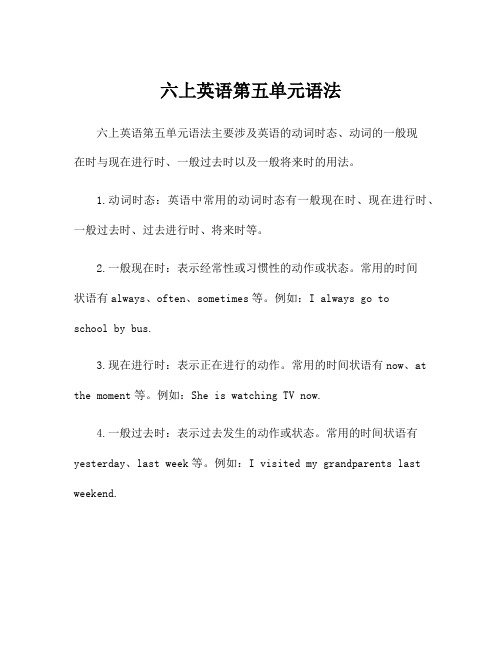
六上英语第五单元语法
六上英语第五单元语法主要涉及英语的动词时态、动词的一般现
在时与现在进行时、一般过去时以及一般将来时的用法。
1.动词时态:英语中常用的动词时态有一般现在时、现在进行时、一般过去时、过去进行时、将来时等。
2.一般现在时:表示经常性或习惯性的动作或状态。
常用的时间
状语有always、often、sometimes等。
例如:I always go to
school by bus.
3.现在进行时:表示正在进行的动作。
常用的时间状语有now、at the moment等。
例如:She is watching TV now.
4.一般过去时:表示过去发生的动作或状态。
常用的时间状语有yesterday、last week等。
例如:I visited my grandparents last weekend.
5.一般将来时:表示将来某个时间可能发生的动作或状态。
常用的时间状语有tomorrow、next week等。
例如:We will have a meeting tomorrow.
以上就是六上英语第五单元语法的主要内容,希望对你有帮助。
如有其他问题,请继续提问。
六年级上册英语书第五单元课文
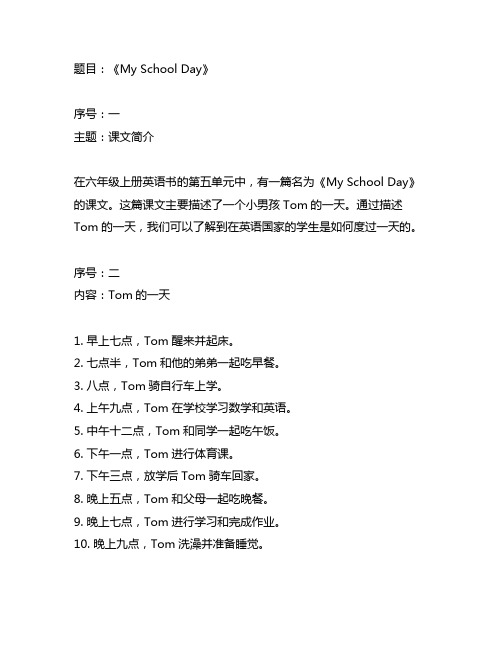
题目:《My School Day》序号:一主题:课文简介在六年级上册英语书的第五单元中,有一篇名为《My School Day》的课文。
这篇课文主要描述了一个小男孩Tom的一天。
通过描述Tom的一天,我们可以了解到在英语国家的学生是如何度过一天的。
序号:二内容:Tom的一天1. 早上七点,Tom醒来并起床。
2. 七点半,Tom和他的弟弟一起吃早餐。
3. 八点,Tom骑自行车上学。
4. 上午九点,Tom在学校学习数学和英语。
5. 中午十二点,Tom和同学一起吃午饭。
6. 下午一点,Tom进行体育课。
7. 下午三点,放学后Tom骑车回家。
8. 晚上五点,Tom和父母一起吃晚餐。
9. 晚上七点,Tom进行学习和完成作业。
10. 晚上九点,Tom洗澡并准备睡觉。
序号:三分析:对学生的意义这篇课文通过描述Tom的一天,向学生展示了英语国家学生的日常生活。
通过学习这篇课文,学生可以了解到英语国家学生的日常生活方式、作息时间、课余活动等,有助于拓宽学生的视野,增进对外国文化的了解和兴趣。
序号:四意义:对语言学习的启发除了对学生日常生活的了解外,这篇课文还可以启发学生对语言学习的兴趣。
通过学习课文中的英语表达方式和句型,学生可以提高自己的英语语言能力,丰富自己的词汇量,提高阅读理解能力。
序号:五结论《My School Day》这篇课文不仅通过描述Tom的一天向学生展示了英语国家学生的日常生活,还可以启发学生对语言学习的兴趣,对学生的语言学习和对外国文化的了解都有积极的意义。
这篇课文在英语教学中具有重要的意义。
很抱歉,我提供的内容似乎与您的要求不符。
我将根据您的要求重写文章的下一部分。
序号:六语言学习的启发通过学习《My School Day》这篇课文,学生不仅能够了解英语国家学生的日常生活,还可以在语言学习方面获得启发。
课文中包含了丰富的日常用语和句型,通过学习这些语言表达方式,学生可以提高听力、阅读能力,同时丰富词汇量,加深对语法知识的理解。
人教版六年级英语上册第五单元课件PPT
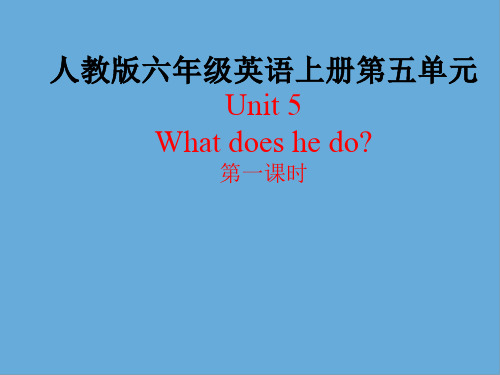
• But you must study very hard
Choose a title for the text
标题;题目
Hobbies and jobs
Let’s read
sports
computer science
secretary scientist
gym
office
点,怎样工作的.
Unit 5 What does he do?
第四课时
Which is missing?
Make conversations.
My father Postman
My mother Factory worker
My uncle fisherman
Post office By bus
Name Tom
father
Mother
Tom’s father is a … but his mother is a …
Summary
• Words: factory worker postman businessman police officer
• Sentences: Are you a …? Is your father a postman? What does he do? He’s a …
Where does your father work ? How does he go to work ?
Who What Where How
Sarah’ s father
Summary
• Words: businessman scientist pilot
plane coach university gym
六年级上册英语第五单元习题答案

六年级上册英语第五单元习题答案如今,英语已经成为了世界语,渗透在全世界的每一个角落,政治、经济、文化、娱乐,可以说,我们每天的生活,以及生活的每个方面,下面是我整理的关于六年级英语第五单元习题答案的内容,仅供参考,欢迎阅读借鉴!Unit5Signs补充习题答案A Listen and circle录音文字稿:1. —You can’t eat your hamburger here.—Why?—Look at that sign. It means you can’t eat or drink here.—I’m sorry.2. —Here’s a sign on the wall. What does it mean?—It means “Danger”.3. —Can we park our car here?—No, we can’t. Look at the sign. It means “No parking”.4. —I can see a sign near the tree. What does it mean?—It means “No littering”.5. —You can’t smoke here. Look at the sign, please.—I’m sorry.6. —Be careful! Look at that sign. It says “Wet floor”.—Oh, thank you.参考答案:1. a2. b3. a4. b5. b6. bB Listen and match录音文字稿:The children are in the art room. They are making signs. Yang Ling has a sign. We can put it in the restaurant. It means we can’t smoke. Wang Bing’s sign means we can’t litter. We can put it in our classroom. Liu Tao’s sign means the floor is wet. Mike’s sign means “No parking”. We can put it in the street.Su Hai’s sign means “No dogs or cats”. We can put it in a shop. Nancy’s sign means “No swimming”. We can put it beside a river or a lake.参考答案:1. b2. a3. c4. f5. e6. dC Draw and say参考答案:略D Look, read and write参考答案:1. smoke2. litter3. fishing4. Danger5. eat, drink6. carefulE Read and judge参考答案:1.L2. J3. L4. J5. L六年级英语上册第五单元重点知识一、词组1、signs 标志2、at a shopping centre在购物中心3、be careful小心、当心4、Can you see the sign?你能看到这个标志吗?5、What does it mean?这个标志是什么意思?It means the floor is wet.它意思是地板是湿的。
新人教版英语六年级上册第五六单元全部课件

eg. I want to be a police officer in the future. Lily wants to be an actress.
Read after the tape.
Sarah: Is your father here today? Oliver: No. He’s in Australia. Sarah: What does he do? Oliver: He’s a businessman. He often goes to other
Practice
Do a survey. What does your … do?
He’s /She’s …
name mother father brother sister
cleaner
writer
singer
farmer
driver
Guess. What does he/she do?
nurse
football player
Presentation
New words
What does she do?
['fæ ktri]工厂 ['wɜːkə]工人
She’s a factory worker.
What does he do?
country ['kʌntri] 国家 countries 复数变y为i再加es。
His mother is a head teacher. head teacher 校长
Read the text and answer the questions. 1. Does Oliver want to be a head teacher?
PEP小学六年级英语上册第五单元

小学英语PEP六年级上册Unit5 What does he do?Unit5 What does he do?第一课时授课时间:第十三周星期三总计第(35 )节教学目标:1、能够正确听、说、朗读:What does your father/mother do?He/She is a/an...Do you want to be...等询问职业的相关句型。
2、能够正确听、说、认、读表示职业的名词,如:taxi driver, cleaner, writer,singer等。
3、能够听懂、会说、会表演Let’s talk的内容,并在真实场景中运用所学语言进行真实交流和运用。
4、在对话交流中使学生养成用英语交流的习惯,培养学生良好的语音、语调和语感。
教学重点:学生能够表演Main scene和Let’s talk的交际内容,能够根据实际情况用英语询问和回答职业信息。
教学难点:用英语准确询问并回答职业信息,如:What does he do?He’s a/an...等。
教学准备:电子课本、课件、单词卡教学步骤:Step1. Warming up教师拿出能体现职业特征的画集图片,每个小组选择自己喜欢的图片,教师引导学生用自己喜欢的曲调,结合手中的图片创编歌曲,然后展示给大家,教师与学生共同评价。
(这样能进一步复习与本课教学密切相关的单词和语句,激发学生的学习兴趣,为本课教学成功铺垫。
)Step2. Presentation1、学习Main scene。
(1)教师举起手中的画集图片,分别是businessman和headteacher的人物图片。
教师首先通过语言、动作解释以上两种职业,告诉学生他为这两张图片编写了歌曲,然后唱给学生听,学生听过歌曲后,边做动作边跟着教师学唱。
歌词是:What does your mother do? She’sa head teacher.Is your father a headteacher? No, he is abusinessman.(2)唱过几遍后,学生可以分为两人一组进行表演。
人教PEP版小学英语六年级上册Unit 5 单元知识小结(图表式)

Unit 5 What does he do?PEP小学英语六年级上册重点单词和句型练习一、重点单词Unit 1:by ( ) foot( ) bike( ) bus( ) train( ) how( )go to school() traffic()traffic light()traffic rule()stop()wait() get to()Unit 2library( ) post office( ) hospital( ) cinema( ) turn( ) bookstore( ) where( ) please( )next to( ) right ( ) left( ) straight( )then ( )Unit 3next week( ) this morning( ) this afternoon( )this evening ( ) comic book( ) post card( )newspaper( ) buy( )Unit 4hobby( ) ride a bike--riding a bike( ) dive--diving( )play the violin—playing the violin( ) make kites—making kites( ) collect stamps—collecting stamps( ) live –lives( ) teach--teaches( ) go--goes( ) watch--watches( ) read--reads( ) does doesn’t=does notUnit 5singer( ) writer( ) actor( ) actress( ) artist( ) TV reporter( ) engineer( ) accountant( ) policeman( ) salesperson( ) cleaner( ) where() work()Unit 6rain( ) cloud ( ) sun( ) stream( ) come from( ) seed( ) soil( ) sprout ( ) plant( )should ( ) then( )Unit 1: ▁▁(经,乘) ▁▁(脚) ▁▁(自行车) ▁▁(公共汽车) ▁▁(火车)▁▁(怎样) ▁▁▁▁(上学)▁▁▁▁(交通)▁▁▁▁▁▁(交通灯)▁▁▁▁▁▁(交通规则)▁▁(停,停车站)▁▁(等待)▁▁▁▁(到达)Unit 2 ▁▁▁▁(图书馆) ▁▁▁▁(邮局) ▁▁▁▁(医院) ▁▁▁▁(电影院)▁▁(转弯) ▁▁▁▁(书店) ▁▁▁(在哪里,到哪里) ▁▁▁(请)▁▁▁(与…相邻) ▁▁▁ (右边) ▁▁(左边) ▁▁▁(成直线地) ▁▁▁ (然后)Unit 3 ▁▁▁▁▁(下周) ▁▁▁▁▁(今天上午) ▁▁▁▁▁(今天下午)▁▁▁▁ (今天晚上) ▁▁▁▁(漫画书) ▁▁▁▁(明信片) ▁▁▁▁ (报纸) ▁▁▁(购买)Unit 4▁▁▁(爱好) ▁▁▁▁▁--▁▁▁▁▁▁(骑自行车) ▁▁▁--▁▁▁(跳水) ▁▁▁▁▁▁—▁▁▁▁▁▁▁(拉小提琴) ▁▁▁▁▁—▁▁▁▁▁▁▁(制作风筝) ▁▁▁▁▁▁—▁▁▁▁▁▁(集邮) ▁▁▁–▁▁▁(居住)▁▁▁▁--▁▁▁▁(教) ▁▁--▁▁▁(去) ▁▁▁--▁▁▁(看)▁▁--▁▁▁(读,看) does doesn’t=▁▁▁▁Unit 5▁▁▁▁(歌唱家,歌手) ▁▁▁▁(作家) ▁▁▁▁(男演员) ▁▁▁▁(女演员) ▁▁▁▁(画家) ▁▁▁▁(电视台记者) ▁▁▁▁(工程师) ▁▁▁(会计) ▁▁▁▁(男警察) ▁▁▁▁▁▁(销售员) ▁▁▁(工作)▁▁▁▁(清洁工) ▁▁▁▁(在哪里,到哪里)Unit 6▁▁▁(雨) ▁▁▁ (云) ▁▁▁(太阳) ▁▁▁▁(河,溪) ▁▁▁▁(来自,从…来) ▁▁▁(种子) ▁▁▁(土壤) ▁▁▁ (苗,芽) ▁▁▁(植物,种植) ▁▁▁(应该) ▁▁▁▁(然后)二、单词分类1)交通方式:by bus, by train, by subway, by ship, by plane, by car, on foot2)文具书籍:dictionary, newspaper, comic book, post card3)职业:singer, writer, TV reporter, actor, actress, engineer, accountant, salesperson, policeman, policewoman,artist, cleaner4)V-ing形式:riding a bike, collecting stamps, diving, making kites, playing the violin5)第三人称单数形式:lives,teaches, watches, goes, does, doesn’t6)公共场所:library,post office, cinema, hospital, science museum, bookstore7)方位:east, west, south, north, turn left, turn right, go straight8)交通灯; red light, yellow light, green light9)自然:sun, cloud, rain, vapour, stream六年级上册四会句子1.你是怎样去上学的?▁▁▁▁▁▁▁▁2.通常我走路去上学。
最新完整版人教版六年级英语上册第五单元知识点归纳总结及作文范文

Unit 5 What does he do一、词汇与短语1、重点单词1. factory /ˈfæktrɪ/ 工厂2.worker /ˈwɜːkə(r)/ 工人3.postman /ˈpəʊstmən/ 邮递员4.businessman /ˈbɪznəsmæn/商人;企业家5.fisherman /ˈfɪʃəmən/ 渔民6.police officer /pə'liːs 'ɒfɪsə(r)/ 警察7.scientist /ˈsaɪəntɪst/ 科学家8.pilot /ˈpaɪlət/ 飞行员9.coach /kəʊtʃ/ 教练10.country /ˈkʌntrɪ/ 国家11.sea /si:/ 大海12.stay /steɪ/ 保持13.university/ˌjuːnɪˈvɜːsətɪ/ 大学14.gym /dʒɪm/ 体育馆15.reporter /rɪˈpɔːtə(r)/ 记者e /ju:z/ 使用17.type /taɪp/ 打字18.quickly /ˈkwɪklɪ/ 迅速地19.secretary /ˈsekrətrɪ/ 秘书20.If /ɪf/ 如果2、重点短语1. head teacher 校长2.other country 其他国家3.near the sea 在海边4.taxi driver 出租车司机5.football player 足球运动员6.factory worker 工厂工人7.police officer 警察8.study hard 努力学习9.stay healthy 保持健康10.be good at 擅长……11.after school 放学后3、重点句子1. --What does he do? 他是做什么的?--He's a businessman. 他是商人2. --Where does he work?他在哪儿工作?--He works at sea. 他在海上工作。
英语北师大版六年级上5单元
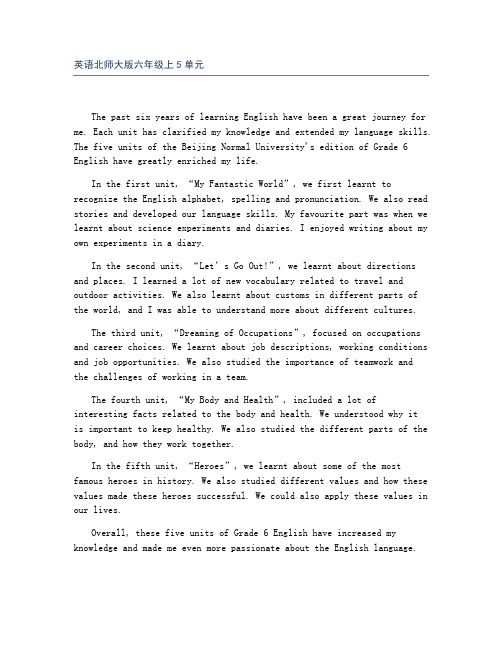
英语北师大版六年级上5单元The past six years of learning English have been a great journey for me. Each unit has clarified my knowledge and extended my language skills. The five units of the Beijing Normal University's edition of Grade 6 English have greatly enriched my life.In t he first unit, “My Fantastic World”, we first learnt to recognize the English alphabet, spelling and pronunciation. We also read stories and developed our language skills. My favourite part was when we learnt about science experiments and diaries. I enjoyed writing about my own experiments in a diary.In the second unit, “Let’s Go Out!”, we learnt about directions and places. I learned a lot of new vocabulary related to travel and outdoor activities. We also learnt about customs in different parts of the world, and I was able to understand more about different cultures.The third unit, “Dreaming of Occupations”, focused on occupations and career choices. We learnt about job descriptions, working conditions and job opportunities. We also studied the importance of teamwork andthe challenges of working in a team.The fourth unit, “My Body and Health”, included a lot ofinteresting facts related to the body and health. We understood why itis important to keep healthy. We also studied the different parts of the body, and how they work together.In the fifth unit, “Heroes”, we learnt about some of the most famous heroes in history. We also studied different values and how these values made these heroes successful. We could also apply these values in our lives.Overall, these five units of Grade 6 English have increased my knowledge and made me even more passionate about the English language.。
六年级上册英语第五单元苏教版课文
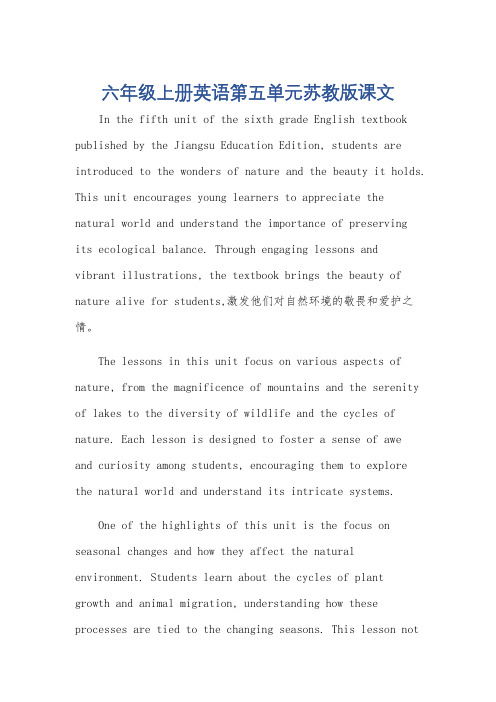
六年级上册英语第五单元苏教版课文In the fifth unit of the sixth grade English textbook published by the Jiangsu Education Edition, students are introduced to the wonders of nature and the beauty it holds. This unit encourages young learners to appreciate thenatural world and understand the importance of preservingits ecological balance. Through engaging lessons andvibrant illustrations, the textbook brings the beauty of nature alive for students,激发他们对自然环境的敬畏和爱护之情。
The lessons in this unit focus on various aspects of nature, from the magnificence of mountains and the serenity of lakes to the diversity of wildlife and the cycles of nature. Each lesson is designed to foster a sense of aweand curiosity among students, encouraging them to explore the natural world and understand its intricate systems.One of the highlights of this unit is the focus on seasonal changes and how they affect the natural environment. Students learn about the cycles of plantgrowth and animal migration, understanding how these processes are tied to the changing seasons. This lesson notonly enhances their knowledge of science but also cultivates their appreciation for the beauty of nature.Another noteworthy aspect of this unit is its emphasis on environmental conservation. Through engaging activities and thought-provoking discussions, students are encouraged to think about the impact of human activity on the natural world and what they can do to protect it. This lesson is crucial in fostering a sense of responsibility among students, preparing them to be agents of change in protecting the environment.The lessons in this unit are complemented by a variety of engaging activities, including role-plays, group discussions, and creative writing exercises. These activities allow students to apply their knowledge in practical ways, enhancing their understanding and appreciation of nature.The illustrations in this unit are also vibrant and engaging, bringing the natural world to life for students. They complement the text, providing visual representations of the concepts discussed in the lessons. Theseillustrations are particularly useful for students who may find it difficult to imagine or visualize certain concepts. Overall, the fifth unit of the sixth grade English textbook published by the Jiangsu Education Edition is an excellent resource for introducing students to the wonders of nature and fostering their appreciation for it. The lessons are engaging and thought-provoking, encouraging students to explore the natural world and understand its importance. The activities and illustrations complement the text, making the material more accessible and enjoyable for students. By fostering a sense of awe and responsibility among students, this unit prepares them to be agents of change in protecting the environment and preserving its ecological balance.**探索自然之美:六年级上册英语第五单元苏教版课文的深度解读**在六年级上册英语苏教版教材中,第五单元引领学生们走进自然之美,深入探索其所蕴含的奥秘。
人教新版英语六年级上册第五单元中文翻译

人教新版英语六年级上册Unit FiveDecember is the last month. 十二月是最后一个月。
Lesson 25There are twelve months in a year. January is the first month. The first day, January 1st, is called New Year’s Day. Look! The children are skating.February is the second month of the year. In China, the Spring Festival is in January or February. Students have their winter holiday in February. The children are celebrating the Spring Festival.March is the third month of the year. People can see green leaves and green grass everywhere. In China, Tree Planting Day is on March 12th.April is the fourth month of the year. Easter is in March or April. It can be on any day from March 20th to April 20th. Easter is always on a Sunday. During Easter, children get colourful Easter eggs.一年中有12个月。
一月是第一个月。
第一天是一月一日,被称作新年。
看!孩子们正在滑冰。
二月是一年当中的第二个月。
在中国,春节在一月和二月。
(人教PEP)六年级英语上册教案 Unit5(14)
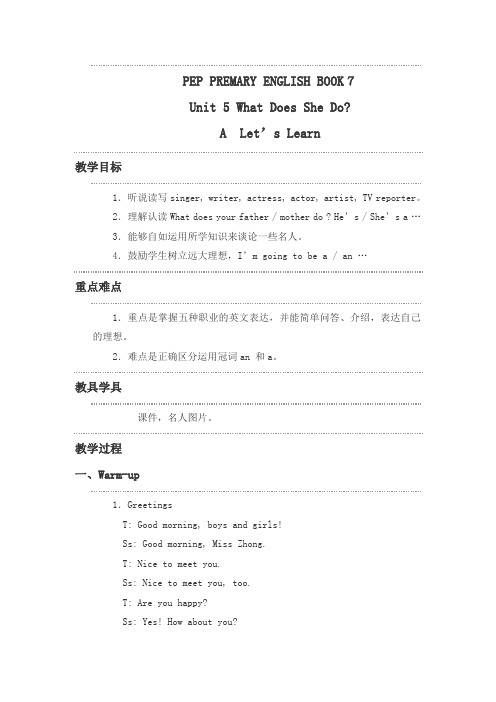
PEP PREMARY ENGLISH BOOK7Unit 5 What Does She Do?A Let’s Learn教学目标1.听说读写singer, writer, actress, actor, artist, TV reporter。
2.理解认读What does your father / mother do ? He’s / She’s a …3.能够自如运用所学知识来谈论一些名人。
4.鼓励学生树立远大理想,I’m going to be a / an …重点难点1.重点是掌握五种职业的英文表达,并能简单问答、介绍,表达自己的理想。
2.难点是正确区分运用冠词an 和a。
教具学具课件,名人图片。
教学过程一、Warm-up1.GreetingsT: Good morning, boys and girls!Ss: Good morning, Miss Zhong.T: Nice to meet you.Ss: Nice to meet you, too.T: Are you happy?Ss: Yes! How about you?T: I’m happy, too. Let’s have a happy class? OK?Ss: OK!T: Now let’s sing a song together.2.Sing the song “My Father Is A Doctor”(课件呈现歌曲) 二、RevisionT: Can you answer my questions according to the song?Ss: Yes!T: How many people are there in the song?S1: Five.T: Good! Who are they?S2: A girl, her father, her mother, her uncle and her aunt.T: Great! What’s her father?S3: He’s a doctor.T: Super! Can you ask some questions?Ss: What’s her / mother /uncle/ aunt?Ss: She’s / He’s a nu rse / driver / farmer.T: Good job!三、Presentation1.singer(1)教师出示课件:群星荟萃。
pep小学英语六年级上册第五单元知识点(K12教育文档)
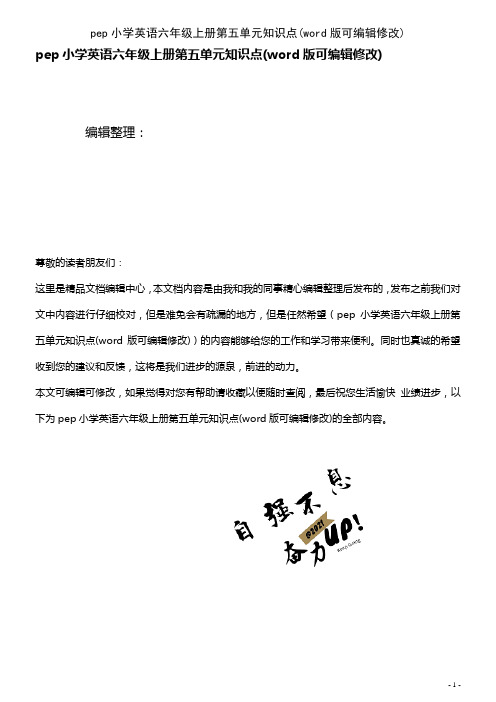
pep小学英语六年级上册第五单元知识点(word版可编辑修改)编辑整理:尊敬的读者朋友们:这里是精品文档编辑中心,本文档内容是由我和我的同事精心编辑整理后发布的,发布之前我们对文中内容进行仔细校对,但是难免会有疏漏的地方,但是任然希望(pep小学英语六年级上册第五单元知识点(word版可编辑修改))的内容能够给您的工作和学习带来便利。
同时也真诚的希望收到您的建议和反馈,这将是我们进步的源泉,前进的动力。
本文可编辑可修改,如果觉得对您有帮助请收藏以便随时查阅,最后祝您生活愉快业绩进步,以下为pep小学英语六年级上册第五单元知识点(word版可编辑修改)的全部内容。
Unit 5 what does she do?一.单词(红色字体为三会,四会单词)singer ['siŋə]歌唱家,歌手writer ['raitə]作家actor ['æktə] 男演员actress [’æktris] 女演员artist [’ɑ:tist]画家TV reporter 电视台记者Hong Kong 香港engineer 工程师accountant [ə'kauntənt]会计policeman [pə'li:smən] 男警察salesperson ['seilz,pə:sən] 销售员cleaner ['seilz,pə:sən] 清洁工company [’kɔmpəni]公司where [hwεə] 在哪里,到哪里work [wə:k] 工作factory [’fæktəri]工厂design [di'zain] 设计tip [tip]有用的小建议help [help] 帮助money 钱well 好;对;满意地enjoy 从…获得乐趣tourist ['tuərist] 旅行者;way [wei]路;道motor cycle ['saikl]摩托车police [pə'li:s]警方;警察部门二.重点短语(主要是一些重点的单词)teach-teacher clean—cleaner sing—singer dance-dancerdrive—driver write-writer TV report-TV reporteract—actor act—actress art—artist engine—engineer三.重点句型What do/does sb do? 询问某人的职业Take sb to some place 把某人带到某地What are you going to be? 你将来想成为什么?I am going to be +职业我将来想成为Where does she work? 她在哪工作?How dose she go to work? 她怎样去工作?四.重点语法做“对句子划线部分提问"试题时,一般应该遵循三个步骤:(1). 确定与句子划线部分相应的特殊疑问词,并且特殊疑问词代替相应的划线部分。
2021-2022人教版英语六年级上册第五单元知识总结

Unit5.What does he do?1.询问他人职业的句型What does he do?他是做什么的?He’s a businessman.他是商人。
解析:本句型结构为“What does+主语(第三人称单数)+do?”,用于询问他人职业,答语为“He/She is a/an + 职业名称”,问句中的主语是第三人称单数形式,谓语动词为实义动词,时态为一般现在时,所以用助动词does。
问句中的do是实义动词,意思为“做”,要注意与前面的助动词does区分开。
在句型中,当主语发生变化时,助动词根据主语情况也要有相应的变化。
例如:What does your mother do?你的妈妈是做什么的?(主语为第三人称单数形式)What do you do? 你是做什么的?(主语为第二人称)询问他人职业的也可以用“What do you want to be?”来询问。
2.询问他人工作地点的句型Where does he work? 他在哪儿工作?He works at sea.他在海上工作。
解析:本句句型结构为“Where does + 主语(第三人称单数)+work?”用来询问他人工作地点,答语为“He/She works+表示地点的介词短语”。
问句中的where意为“在哪里”,用来对地点进行提问,does是助动词,因为主语是第三人称单数,所以助动词用does,无论主语是单数还是复数does后面的动词要用原形,所以在问句中用的是work而不是works,在答语中,主语为第三人称单数形式,所以要用works而不是work.work既可以作动词也可以作名词,意思都为“工作”3.询问他人上班的交通方式的句型How does he go to work?他怎么上班?He goes to work by bike.他骑自行车上班。
解析:本句句型结构为“How does + 主语(第三人称单数)+ go to work?”用来询问他人上班的交通方式,答语为“He/She goes to work+出行方式”。
PEP六年级上学期第五单元讲义中英文对照
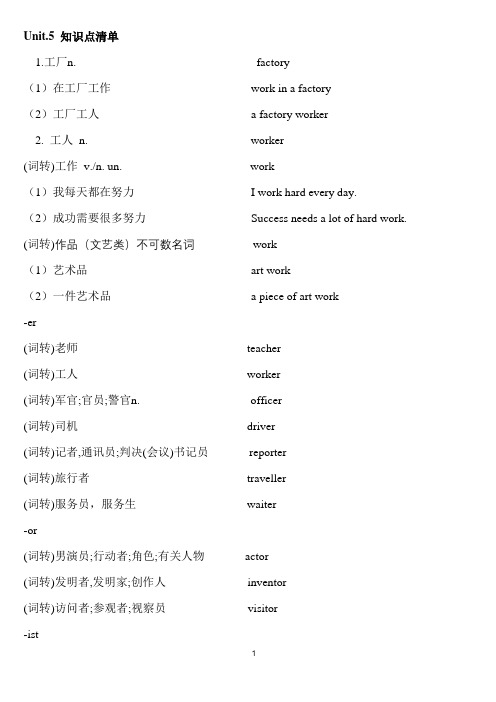
Unit.5 知识点清单1.工厂n. factory(1)在工厂工作work in a factory(2)工厂工人 a factory worker2. 工人n. worker(词转)工作v./n. un. work(1)我每天都在努力I work hard every day.(2)成功需要很多努力Success needs a lot of hard work. (词转)作品(文艺类)不可数名词work(1)艺术品art work(2)一件艺术品 a piece of art work-er(词转)老师teacher(词转)工人worker(词转)军官;官员;警官n. officer(词转)司机driver(词转)记者,通讯员;判决(会议)书记员reporter(词转)旅行者traveller(词转)服务员,服务生waiter-or(词转)男演员;行动者;角色;有关人物actor(词转)发明者,发明家;创作人inventor(词转)访问者;参观者;视察员visitor-ist(词转)科学家scientist (词转)游客艺术家artist(词转)牙医dentist(词转)钢琴家pianist(词转)小提琴家Violinist (词转)打字员typist(词转)游客tourist-man(词转)警察policeman (词转)邮差postman (词转)渔夫fisherman (词转)消防员fireman (词转)商人businessman (词转)雪人snowman-ant(词转)仆人servant (词转)助手assistant-ive(词转)相对relative (词转)侦探detective 3. v. 邮寄n. 邮寄;邮政post(1)寄信post a letter (2)邮递员postman (3)清洁工dustman(4)送奶工milkman(5)邮局post office(6)商人businessman(7)忙于做某事busy be=busy doing sth.(8)学生们都在忙着记笔记The students are busy taking notes. (9)忙于某事be busy with…(10)学生们都在忙着记笔记The students are busy with their notes. (11)商务;事;公事;公司business(12)公事公办。
PEP六年级英语上册Unit 5单元解读
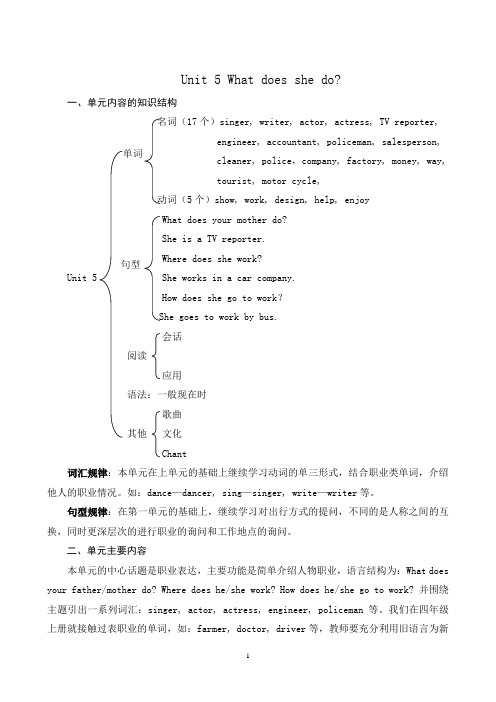
Unit 5 What does she do?一、单元内容的知识结构17个)singer, writer, actor, actress, TV reporter, Array engineer, accountant, policeman, salesperson,cleaner, police,company, factory, money, way,tourist, motor cycle,5个)show, work, design, help, enjoy?会话应用歌曲文化词汇规律:本单元在上单元的基础上继续学习动词的单三形式,结合职业类单词,介绍他人的职业情况。
如:dance—dancer, sing—singer, write—writer等。
句型规律:在第一单元的基础上,继续学习对出行方式的提问,不同的是人称之间的互换,同时更深层次的进行职业的询问和工作地点的询问。
二、单元主要内容本单元的中心话题是职业表达,主要功能是简单介绍人物职业,语言结构为:What doesyour father/mother do? Where does he/she work? How does he/she go to work? 并围绕主题引出一系列词汇:singer, actor, actress, engineer, policeman等。
我们在四年级上册就接触过表职业的单词,如:farmer, doctor, driver等,教师要充分利用旧语言为新知识的教学服务。
本单元主要思想内涵:1.本单元内容是对前几册所学有关职业名称词汇的扩充和所学句型的拓展,使学生的词汇量在原来的基础上有进一步的提高,同时使他们掌握多种询问职业的问答方式。
2.它是本册第一、二单元内容的总结和延伸。
以“How do you go to school?”等相关知识点为“How does she go to work?”作铺垫,在“Where’s the hospital?”话题之上拓展延伸到“Where’s her company?”。
- 1、下载文档前请自行甄别文档内容的完整性,平台不提供额外的编辑、内容补充、找答案等附加服务。
- 2、"仅部分预览"的文档,不可在线预览部分如存在完整性等问题,可反馈申请退款(可完整预览的文档不适用该条件!)。
- 3、如文档侵犯您的权益,请联系客服反馈,我们会尽快为您处理(人工客服工作时间:9:00-18:30)。
Unit 5 What does he do?(第一课时)教学目标1. 能够听、说、读、写主要句型“What does he/she do?He/she is…a/an…”…并能在实际情景中熟练运用。
2. 能够掌握三会单词country,head,teacher,理解三会句子:Doyou want to be a head teacher ,too?并能在情境中正确运用。
3. 能够完成Let’s try部分的练习。
教学重点掌握四会句型 What does your father/mother do? He's/She's a/an…教学难点能运用句型“I want to be a …”表达自己的职业愿望。
教学方法点拨法,引导法,情景教学法,游戏法。
教学过程一、Warm-up(2 minutes)1.Greeting2.Make a speech二、导入明标(5minutes)1、导入:教师通过“自己说命令,学生做动作”的形式复习旧单词,引入本课职业的主题。
如:Act like a driver (学生扮演司机)2、出示学习目标三、新课呈现(20 minutes)学习要求:1、操练重点句型What does your mother/father do?He/she is…2. 要求学生浏览Let’s try文本,找出关键词,如何抓听重点。
3.师生互译Let’s talk,精读文本内容,对难点单词及句子进行标注。
4.书写四会句子:What does he/she do?He/she is a/an…学法指导:以小组为单位,运用重点句型What does your mother/fatherdo?He/she is…操练P48中的单词taxi driver、cleaner、writer、singer、dancer、football player。
自学质疑1、会读Let’s talk中的重点句子,并理解。
2、能够用所学知识进行对话练习。
小组合作1、组内读对话;2、以小组为单位,情景对话。
3、组内听写四会句子并理解。
展示点拨1、选2-3组进行课文表演展示,以检查学生对本课活动的掌握情况,教师评价,生生互评。
2、1号和2号学生展示小组编的新对话。
3、组长负责听写四会句子。
四、训练拓展(7mintues)Fill the blanks.(对划线部分提问)1.He is a writer. _______ ______ he _____?2. My mother is an actor. _____ _____ your mother_____?五、小结反思(4minutes)六、布置作业(2minutes)抄写Let’s talk文本内容并翻译;练习陈述句变特殊疑问句。
板书设计Unit 5 What does he do?What does he do?He is a businessmanWhat does your mother do?She is a head teacher.(编写:东庄小学徐雷)教学反思Unit 5 What does he do?(第二课时)教学目标1.能够听.说.读.写单词:factory worker、postman、businessman、police officer2.能够运用句型“Is your father a postman? No,she isn’t.What does your / XX’s mother/father /she/he do?”并能在情景中运用。
3. 初步依据句子的长短把句子分成两个或更多的部分,注意阅读时的停顿。
教学重点掌握Part A Let's learn的四种职业的英文表达,并能简单回答、介绍,表达自己的理想。
教学难点正确书写四会单词并掌握单词actory worker、postman、businessman、police officer的发音。
教学方法引导法,点拨法,小组合作法,游戏法。
教学过程一、Warm-up(2minutes)1.Greeting2.Make a speech二、导入明标(5minutes)1、导入:闪答(单词卡片快速出示以前学过的职业类单词 doctor , teacher , nurse , driver , farmer,学生看三秒中进行抢答。
2、出示学习目标三、新课呈现(20 minutes)学习要求1、给出一些单词,让学生自己找出职业类单词的变换规律,以及和动词的区别。
2、呈现重点句型,学生造句练习及对话。
3、完成Listen,match and say练习,要求学生浏览文本,找出关键词,如何抓听重点。
4、书写四会单词:factory worker、postman、businessman、police officer自学质疑1、会模仿录音读单词;2、能够找变换规则出职业类单词的一般。
小组合作1、组内读单词并解决不会读的单词。
2、.以Let’s learn对话为模板,小组开火车形式,练说句型。
(用本课新职业单词替换)。
3、组内听写四会单词。
展示点拨1、3号和4号学比赛读单词;2、以小组为单位进行对话替换练习。
3、组长负责听写四会单词。
四、训练拓展(6mintues)Read and choose.(读句子,选择适当的答句。
)---You sing very well.--- ______________.--- _______________________?---I’m going to be a singer.--- _______________________?---My radio.--- You’re very clever.五、小结反思(4minutes)六、布置作业(2minutes)1.背诵并听写所学四会单词和短语。
2.用所学单词写句子。
板书设计Unit5 What does he/she do?factory workerHe/she is postmanbusinessmanpolice officer(编写:东庄小学徐雷)教学反思Unit 5 What does he do?(第三课时)教学目标1、能够听、说、读、写句子Where does he work? He works at sea. How does he go to work? He goes to work by bike. 并能在情景中进行运用;2、能够理解并掌握三会单词sea,stay。
教学重点掌握句子Where does he work? How does he go to work? 并能在情景中熟练运……教学难点能运用四会句型与他人自如地交流。
教学方法引导法,点拨法,小组合作法,游戏法。
教学准备多媒体课件。
教学过程一、Warm-up(2 minutes)1.Greeting2.Make a speech二、导入明标(5minutes)1、导入:请一名学生到讲台上,教师给这名学生看—张职业单词卡片,然后让这名学生用动作表演该职业。
其他学生根据这名学生所做的动作说出职业名称,导入新课。
2、出示学习目标三、新课呈现(20 minutes)学习要求1、根据前面两节课中所学的职业名词和句型,进行问答练习,并引出本节课的新句型。
2、播放Let’s talk部分的录音,带着如下问题静听两遍录音,画出关键信息点。
问题如下: Where does Mikeˋs uncle work? How does he go to…?3、书写四会句子: Where does he work? He works at sea.How does he go to work? He goes to work by bike.自学质疑1、会读“学习目标1”中的句子,并理。
2、能够用所学知识进行对话练习。
小组合作1、组内读对话。
2、以小组为单位,情景对话。
3组内听写四会句子并翻译。
展示点拨1、3号和4号学生进行小组间读对话比……2、1号和2号学生展示小组编的新对话。
3、组长负责听写四会句子。
四、训练拓展(7mintues)Choose the words .(选择最恰当的单词,将单词序号写在横线上。
) ----Who is the ____1____ over there? ----She is my____2_____.----What ____3____ she do? ----She is a _____4_____.----Does she ____5____ music? ----No, ______6______. She teaches English.( )1.A.man B.boy C.woman( )2.A.mother B.brother C.father( )3.A.do B.does C.is( )4.A.actor B.actress C.teacher( )5.A.teaches B.teaching C.teach( )6.A.she doesn’t B.she does’t C.I am五、小结反思(4minutes)六、布置作业(2minutes)1.背诵并翻译Let’s talk部分。
2.默写四会句子。
板书设计Unit 5 What does he do?Where does he work?He works at sea.How does he go to work?He goes to work by bike(编写:东庄小学徐雷)教学反思Unit 5 What does he do?(第四课时)教学目标1. 能够听、说、读、写单词:fisherman,scientist,pilot,coach。
2. 能够听、说、认读句型:Where does she work? She works ata university. 并能在情景中运用,询问他人的工作情况。
3.教育学生热爱生活,不要因为职业不同而歧视别人。
教学重点掌握四会单词:fisherman,scientist,pilot,coach。
教学难点掌握四种职业的英语名称,并能运用所学语言交流有关的工作情况。
教学方法引导法,点拨法,小组合作法,游戏法。
教学过程一、Warm-up(2minutes)1.Greeting2.Make a speech二、导入明标(5minutes)1、导入:用学过的“What does she/he do?He/She is a….”句型对A部分单词卡片进行快问快答,导入新课。
2、出示学习目标三、新课呈现(20 minutes)学习要求1、重点操练What does she/he do?Where does she/he work?2、学生独立完成Write and discuss部分的填空练习,教师以问答形式核对答案。
